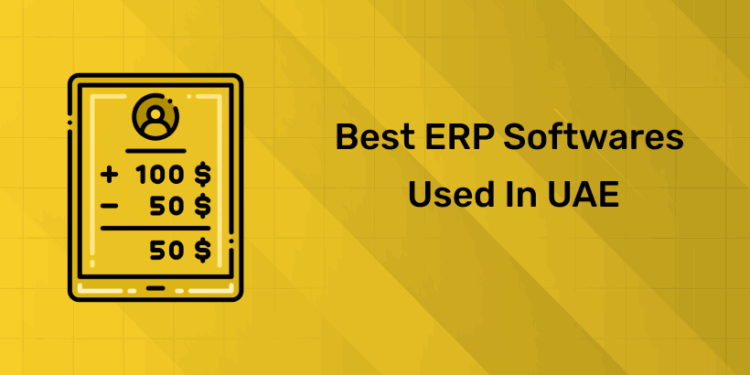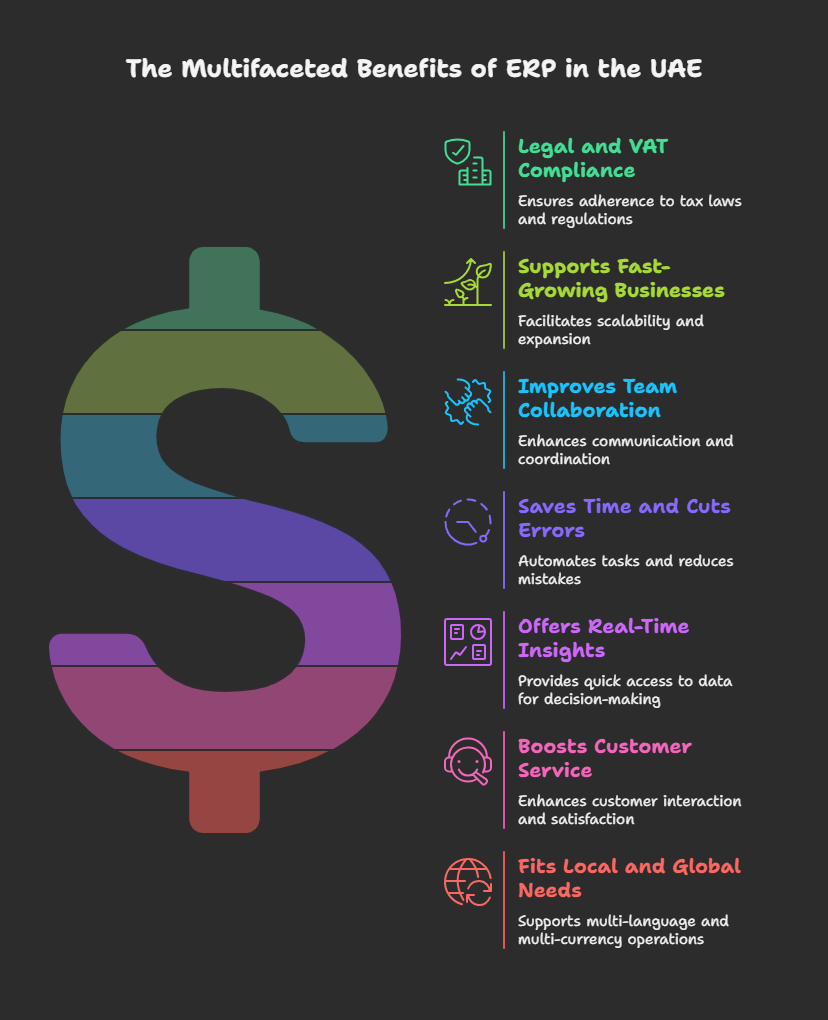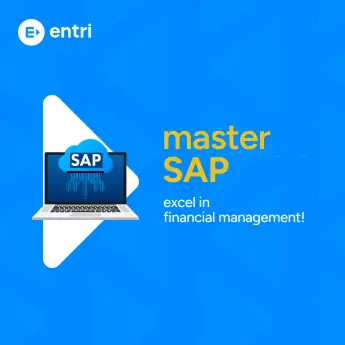Table of Contents
Are you looking for the best ERP softwares used in UAE?
This year, in 2026, businesses across the UAE are utilizing ERP tools to manage everything from accounting to customer service. These ERP systems help companies to save time, reduce errors, and work more efficiently. Regardless of whether you’re running a small shop or a large company, the right ERP software can make a significant difference.
Let’s have a look at why ERP is important and which tools are most popular in the UAE this year.
Join Entri’s SAP FICO Training Course today!!
Best ERP Software Used in UAE (2026): Introduction
The UAE is moving fast toward digital business. Companies need smarter tools to manage growth and daily tasks.
That’s where ERP software comes in.
ERP (Enterprise Resource Planning) helps run a business from one system. It connects departments like sales, HR, accounts, and inventory. In 2026, UAE companies, big and small, are choosing ERP for better control, speed, and success.
Here’s why ERP is gaining attention across the UAE:
1. Digital-First Business Culture
- UAE promotes digital solutions for all sectors.
- National plans like Vision 2031 support smart tech.
- ERP matches this push for automation and AI.
2. Diverse Business Landscape
- UAE has many industries: retail, oil, logistics, healthcare.
- Each industry has different needs.
- ERP offers flexible tools for all sectors.
3. Need for Centralized Control
- Many businesses operate across cities and countries.
- They need to manage data from one place.
- ERP connects branches and teams in real-time.
4. Focus on Efficiency
- Manual work slows down growth.
- Mistakes in reports or payroll cost time and money.
- ERP automates tasks and improves accuracy.
5. Cloud and Mobile Access
- Cloud systems are rising fast in the UAE.
- Teams want to work from anywhere.
- ERP tools now offer secure mobile and web access.
ERP software is no longer just an option—it’s a must for staying competitive. In the next section, let’s understand why ERP is crucial for UAE businesses.
Why ERP is Crucial for UAE Businesses
UAE companies face high competition and fast-changing markets. To grow and stay compliant, they need better systems. ERP software solves many business problems with one smart solution.
Here’s how ERP helps businesses in the UAE:
1. Ensures Legal and VAT Compliance
- VAT is mandatory since 2018.
- Records must be clean and up to date.
- ERP tracks tax, generates reports, and avoids penalties.
2. Supports Fast-Growing Businesses
- UAE startups grow and expand quickly.
- They often open new offices or sell online.
- ERP scales easily with the business.
3. Improves Team Collaboration
- Many teams work across cities or countries.
- ERP connects sales, finance, HR, and warehouse.
- Everyone works on the same system.
4. Saves Time and Cuts Errors
- Manual work is slow and risky.
- Errors in inventory, payroll, or billing are costly.
- ERP automates tasks and checks for mistakes.
5. Offers Real-Time Insights
- CEOs and managers need quick data.
- ERP gives live dashboards and custom reports.
- Better data = better decisions.
6. Boosts Customer Service
- ERP connects orders, inventory, and support.
- Customers get faster responses and better service.
- Happy customers help grow the business.
7. Fits Local and Global Needs
- UAE businesses often deal in multiple currencies.
- They also need Arabic and English support.
- ERP tools offer multi-language and multi-currency features.
| Benefit | How ERP Helps |
|---|---|
| VAT & Compliance | Auto tax reports, audit-ready data |
| Fast Growth Support | Scales with users, branches, and features |
| Team Collaboration | One system for all departments |
| Time & Error Reduction | Automation and accurate data |
| Real-Time Decision Making | Dashboards, live updates, and analytics |
| Better Customer Experience | Faster orders, service, and response tracking |
| Local + Global Readiness | Supports Arabic, English, and multiple currencies |
Master SAP with Expert-Led Courses
Unlock your potential with our comprehensive SAP courses! Learn essential modules like SAP MM (Materials Management), SAP SD (Sales and Distribution), and SAP FICO (Financial Accounting and Controlling) from industry experts.
Know MoreTop ERP Software Used in UAE (2026)
Many businesses in the UAE choose ERP tools based on size, industry, and budget. Some prefer global platforms like SAP and Oracle, while others go for region-friendly tools like TallyPrime and Zoho.
Below are the most popular ERP tools in the UAE for 2026 with simple breakdowns of their features, strengths, and fit.
1. SAP Business One
SAP is a trusted global ERP brand used by large firms. SAP Business One is popular with UAE SMEs due to its power and flexibility.
Key Features:
- Real-time financial tracking and analytics
- Inventory, procurement, and CRM tools
- Cloud and on-premise options
Why UAE Businesses Choose SAP:
- Works well for growing companies
- Supports Arabic and English
- Strong support for VAT compliance
2. Oracle NetSuite
NetSuite is a cloud-based ERP used by many global and regional firms. It’s ideal for fast-scaling UAE businesses.
Key Features:
- Real-time dashboards and forecasting
- Multi-currency and multi-country support
- Integrates with many business apps
Why UAE Businesses Choose NetSuite:
- Cloud-native and highly scalable
- Strong for finance, inventory, and eCommerce
- Trusted by many tech startups
3. Zoho ERP (Zoho One)
Zoho One is an all-in-one suite for small and medium businesses. It’s widely used in the UAE due to its affordability and simplicity.
Key Features:
- Includes CRM, HR, accounting, and project tools
- Offers mobile access and cloud storage
- Custom workflows and automation
Why UAE Businesses Choose Zoho:
- Budget-friendly with many tools in one
- Easy for startups and SMEs to use
- Good Arabic interface support
4. TallyPrime
TallyPrime is a well-known ERP for finance and accounting. It’s highly favored by UAE traders, retailers, and small companies.
Key Features:
- Strong accounting and inventory management
- Simple VAT return filing
- Fast setup and easy use
Why UAE Businesses Choose TallyPrime:
- Very user-friendly
- Excellent for VAT tracking
- Ideal for small trading and service firms
5. Microsoft Dynamics 365
Microsoft Dynamics 365 offers a powerful mix of CRM and ERP features. It’s suited for medium to large companies across industries.
Key Features:
- Sales, finance, HR, and supply chain modules
- Integrates with Microsoft tools (Excel, Outlook)
- AI-powered insights
Why UAE Businesses Choose Dynamics:
- Familiar Microsoft interface
- Strong data security and cloud services
- Works well for remote teams
6. Odoo ERP
Odoo is an open-source ERP that’s gaining popularity in the UAE. It’s flexible and cost-effective for SMEs.
Key Features:
- Apps for sales, finance, HR, and marketing
- Open-source and fully customizable
- Cloud or on-premise options
Why UAE Businesses Choose Odoo:
- Low-cost and open-source
- Easy to customize for local needs
- Good support for startups
7. SAP S/4HANA
This is SAP’s advanced ERP for large enterprises. It’s used by multinational companies with UAE branches.
Key Features:
- Advanced financial planning and control
- Integrated with AI and machine learning
- Works on the cloud or on-site
Why UAE Businesses Choose S/4HANA:
- Ideal for large-scale operations
- Powerful data processing and analytics
- Reliable for high-volume transactions
8. Focus 9 ERP
Focus 9 is a popular ERP in the Middle East. It is built by Focus Softnet and is designed for regional needs.
Key Features:
- Covers finance, HR, CRM, and production
- Offers strong mobile and cloud support
- Built-in VAT and compliance tools
Why UAE Businesses Choose Focus 9:
- Designed for GCC markets
- Easy to customize for different industries
- Good Arabic language support
9. Sage 300 ERP
Sage 300 is a reliable ERP for growing businesses. It is used in industries like retail, finance, and construction.
Key Features:
- Strong financial management tools
- Inventory and distribution tracking
- Multi-currency and multi-location support
Why UAE Businesses Choose Sage 300:
- Known for stable finance modules
- Good for multi-branch firms
- Used widely in trading companies
Updated Comparison Table – Popular ERP Software Used in the UAE (2026)
| ERP Tool | Best For | Cloud Support | VAT Support | Key Strength |
|---|---|---|---|---|
| SAP Business One | SMEs & mid-size firms | Yes | Yes | Flexible & scalable |
| Oracle NetSuite | Fast-growing firms | Yes | Yes | Cloud-native & global-ready |
| Zoho One | Startups & SMEs | Yes | Yes | Budget-friendly all-in-one |
| TallyPrime | Traders & retailers | Limited | Yes | Easy accounting & VAT |
| Dynamics 365 | Medium & large firms | Yes | Yes | Microsoft integrations |
| Odoo | SMEs & tech firms | Yes | Yes | Open-source & customizable |
| SAP S/4HANA | Enterprises | Yes | Yes | Enterprise-grade analytics |
| Focus 9 | Local & regional firms | Yes | Yes | GCC-ready & multilingual |
| Sage 300 | Traders & mid-size firms | Yes | Yes | Strong finance features |
These tools are leading the UAE ERP market in 2026. In the final section, we’ll summarize the key takeaways.
Join Entri’s SAP FICO Training Course today!!
Best ERP Software Used in the UAE (2026): Summary
ERP software is essential for UAE businesses in 2026. It improves efficiency, compliance, and scalability. Choosing the right ERP depends on business size, industry, and needs.
Key Takeaways:
- ERP ensures VAT compliance across all sectors.
- Cloud-based solutions allow businesses to work remotely.
- Automation reduces manual tasks and errors.
- Real-time data improves decision-making and control.
- Scalable solutions grow with your business.
- Industry-specific tools cater to unique needs (e.g., retail, finance).
- Popular tools like SAP, Oracle, and Zoho dominate the UAE market in 2026.
ERP helps businesses stay competitive and efficient in a rapidly evolving market. Selecting the right ERP tool is the key to long-term growth and success.
Master SAP with Expert-Led Courses
Unlock your potential with our comprehensive SAP courses! Learn essential modules like SAP MM (Materials Management), SAP SD (Sales and Distribution), and SAP FICO (Financial Accounting and Controlling) from industry experts.
Know MoreFrequently Asked Questions
What is ERP software and why is it important for UAE businesses?
ERP (Enterprise Resource Planning) software integrates various business processes like accounting, HR, inventory, and sales into one unified system. It helps businesses improve efficiency, reduce errors, and streamline operations. For UAE businesses, ERP is crucial for managing VAT compliance, making real-time decisions, and scaling with growth. It also supports remote work and helps businesses stay competitive in the digital age.
How can ERP help UAE businesses comply with VAT regulations?
ERP software automates VAT tracking and reporting, ensuring compliance with the UAE’s VAT laws. It automatically calculates VAT on sales and purchases, generates VAT return reports, and provides audit trails for transparency. ERP tools like SAP and TallyPrime include built-in VAT features that simplify this process. Businesses can easily stay up to date with tax laws without manual intervention.
What industries in the UAE benefit most from ERP systems?
Industries such as retail, manufacturing, healthcare, logistics, and finance greatly benefit from ERP systems. For example, retail businesses use ERP to manage inventory and customer relationships. Manufacturing companies can track production, resources, and supply chains. Each sector uses ERP to streamline operations and improve efficiency while adhering to industry-specific regulations.
Is ERP software suitable for small businesses in the UAE?
Yes, ERP software is suitable for small businesses in the UAE, especially when scalability and growth are key goals. Tools like Zoho and TallyPrime are designed to be cost-effective and easy to use. They offer basic features that are perfect for small businesses while providing the flexibility to grow. These ERP tools allow small businesses to manage financials, inventory, and compliance from day one.
How do ERP systems improve decision-making in UAE businesses?
ERP systems provide real-time data and insights, allowing business owners and managers to make informed decisions quickly. With access to dashboards and automated reports, companies can track performance, identify trends, and act on opportunities immediately. This leads to better planning and forecasting. Businesses can also monitor key metrics like sales, cash flow, and inventory in one centralized system.
What is the difference between cloud and on-premise ERP?
Cloud ERP is hosted on the internet, making it accessible from anywhere with an internet connection. On-premise ERP is installed on local servers within the company’s infrastructure. Cloud ERP is more flexible, scalable, and often lower in upfront costs, while on-premise ERP offers more control over data security. UAE businesses often choose cloud ERP due to remote access and minimal IT infrastructure.
Can ERP software be customized for specific business needs?
Yes, most ERP software, including SAP and Oracle NetSuite, allows for customization to meet specific business requirements. Customization can include adding modules for unique processes, integrating third-party applications, or modifying workflows. Businesses in the UAE can tailor ERP tools to their industry needs, ensuring the system fits their operations. However, the level of customization depends on the ERP platform and budget.
How does ERP help businesses grow in the UAE?
ERP helps businesses scale by automating tasks, improving accuracy, and providing real-time data to make better decisions. As companies in the UAE grow, ERP systems like Zoho and NetSuite adapt to increasing complexity. These tools streamline operations and connect departments, reducing manual errors and inefficiencies. ERP also supports multi-location and multi-currency operations, which is crucial for expanding UAE businesses.
What are the challenges when implementing ERP in a UAE business?
Implementing ERP can be challenging due to the high cost, time, and resources needed for setup. There is often resistance from employees due to changes in processes. Proper training and support are crucial to smooth adoption. Businesses must also ensure that the ERP system is properly integrated with existing software and workflows for maximum efficiency.
Which ERP tools are most popular in the UAE market in 2026?
In 2026, some of the most popular ERP tools in the UAE are SAP Business One, Oracle NetSuite, Zoho One, and TallyPrime. These platforms are favored by businesses due to their scalability, flexibility, and industry-specific features. SAP and Oracle are popular among large businesses, while Zoho and TallyPrime are preferred by SMEs for their affordability and user-friendly interfaces. Each tool offers strong VAT compliance and multi-currency support.












